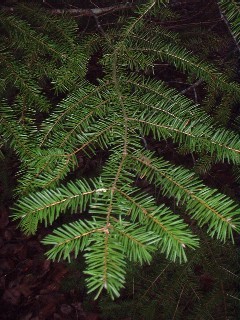Trees
Fir
 Fir trees are the most common and abundant in this forest. There are
between 45 to 50 species of evergreen conifers. They are part of
the pine family. Their shorter needles distinguish them from the other
pines. Some species can reach heights of over two hundred forty feet
tall, (75 m).
Fir trees are the most common and abundant in this forest. There are
between 45 to 50 species of evergreen conifers. They are part of
the pine family. Their shorter needles distinguish them from the other
pines. Some species can reach heights of over two hundred forty feet
tall, (75 m).
The area was
clear cut removing almost every tree in the 1940's. Scars from the strip logging can still be seen today. Seed trees were required to be left to re-seed the forest. A large fir tree, which was named
Fangorn
by my Grand Parents, still stands today over this forest. This tree
shows us the scale and grandeur of previous trees in this area.
Changes in the
environment like air pollution, water contamination and global warming
weaken the trees and make them more susceptible to disease. This is
a sensitive ecosystem which has been weakened by changes in the
environment.
************ ************
************
|
Links
The following websites have information
about Fir trees. I do not endorse any of
these websites but I did find their information useful.
* If you want to copy a multi line link click
URL Help.
Abies balsamea
Information From
Answers.com
Abies concolor description
Abies concolor White Fir.
Abies grandis fact sheet
Article about Fir
in the English Wikipedia
Definition of Fir
Fir
Wikipedia,
the free encyclopedia
Insects - Trees - Evergreen
Species Abies concolor
Trees Abies concolor
|
|

